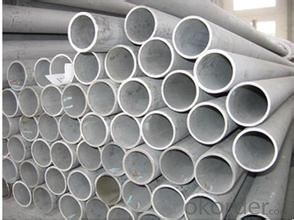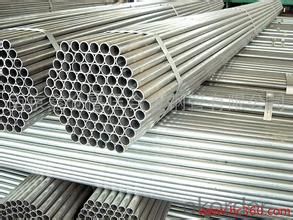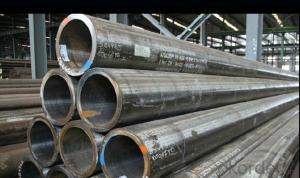ASTM A335 P91 High Alloy Steel Tube
- Loading Port:
- China Main Port
- Payment Terms:
- TT or LC
- Min Order Qty:
- 25-35 m.t.
- Supply Capability:
- -
OKorder Service Pledge
OKorder Financial Service
You Might Also Like
Quick Details
| Thickness: | 1.5 - 70 mm | Section Shape: | Round | Outer Diameter: | 0.125 - 20 inch |
| Place of Origin: | Shandong China (Mainland) | Secondary Or Not: | Non-secondary | Application: | Hydraulic Pipe |
| Technique: | Hot Rolled | Certification: | SGS/BV/IBS | Surface Treatment: | Oiled |
| Special Pipe: | Thick Wall Pipe | Alloy Or Not: | Is Alloy | Length: | Random length or fixed length |
| Grade: | 10#,20#,15CrMo,12Cr1MoV,12CrMo,16Mn,A179-C,A213,A210,A335 P12,A178-C,A199,St35.8,St37-2,Q235,10#-45#,Cr-Mo alloy,A53-A369,ST35-ST52,Q195-Q345 | Standard: | JIS G3445-2006,JIS G3446-2004,GB/T 8163-1999,GB/T 8162-1999,GB 5130,DIN 1629/3,DIN 2391,DIN 17175,DIN 2448,ASTM A106-2006,ASTM A213-2001,ASTM A53-2007,ASTM A210-1996,ASTM A335-2006,ASTM A179-1990,JIS,GB,DIN,ASTM |
Packaging & Delivery
| Packaging Detail: | Standard seaworthy packing,or as per customer's request. |
| Delivery Detail: | In 7-30days |
Specifications
high temperature A335 P91 alloy steel tube:
1. MOQ:10MT
2. OD:1/8"-20"
3. Standard:ASTM,DIN,JIS,GB
4. Fast delivey
high temperature seamless A335 P91 alloy steel tube:
Standard | ASTM, BS, JIS, DIN |
Steel Grade | ASTM A210-C,A333,A334,A335,P11,P5,P9,P91,A209 T1,SAE4130/JIS G3455,G3464,G3460,G3462,G3458/DIN st52,st35N/ BS3059.3T53,GB 16Mn,12CrMo,35CrMo |
O.D. | 1/8"-20" |
W.T. | SCH10-XXS |
Length | 5m-12m |
Outside Coating | Black painting, anti-corrosion oil, galvanized or as per required by customers |
Packing | Wrapped in bundles by steel strips/bulk |
Carbon steel seamless pipe price | USD950-USD1800/Ton |
Third party inspection | SGS/BV |
Production Capacity | 400,000tons per year |
Delivery time | 20 days |
Main market | Asia, India, Middle East, America, Europe |
High Alloy Steel Tube Image


FAQ of High Alloy Steel Tube
①How is the quality of your products?
Our products are manufactured strictly according to national and internaional standard, and we take a test
on every pipe before delivered out. If you want see our quality certifications and all kinds of testing report, please just ask us for it.
Guaranteed: If products’ quality don’t accord to discription as we give or the promise before you place order, we promise 100% refund.
②How about price?
Yes, we are factory and be able to give you lowest price below market one, and we have a policy that “ for saving time and absolutely honest business attitude, we quote as lowest as possible for any customer, and discount can be given according to quantity”,if you like bargain and factory price is not low enough as you think, just don’t waste your time.Please trust the quotation we would give you, it is professional one.
③Why should you chose us?
Chose happens because of quality, then price, We can give you both.Additionally, we can also offer professional products inquiry, products knowledge train(for agents), smooth goods delivery, exellent customer solution proposals.Our service formula: good quality+good price+good service=customer’s trust
SGS test is available, customer inspection before shipping is welcome, third party inspection is no problem.
Any question, pls feel free to contact us !
- Q:What is the maximum allowable stress for steel pipes?
- The maximum allowable stress for steel pipes depends on various factors such as the grade of steel, diameter, wall thickness, and the intended application. It is typically determined by industry standards and codes, such as the American Society of Mechanical Engineers (ASME) Boiler and Pressure Vessel Code. Therefore, there is no one-size-fits-all answer to this question.
- Q:What are the different methods of inspecting steel pipes?
- There are several methods of inspecting steel pipes, including visual inspection, ultrasonic testing, magnetic particle testing, dye penetrant testing, radiographic testing, and eddy current testing.
- Q:How are steel pipes used in the manufacturing of chemical storage tanks?
- Steel pipes are commonly used in the manufacturing of chemical storage tanks as they provide structural support and serve as conduits for the transportation of chemicals. These pipes are typically used for connecting various components of the tank, such as the inlet and outlet valves, as well as for creating the internal plumbing system. The durability and corrosion resistance of steel make it an ideal material for ensuring the integrity and longevity of chemical storage tanks.
- Q:What are the different methods of coating steel pipes?
- There are several different methods of coating steel pipes, including fusion bonded epoxy (FBE) coating, liquid epoxy coating, polyurethane coating, and three-layer polyethylene (3LPE) coating.
- Q:Can steel pipes be used for underground heat exchange systems?
- Yes, steel pipes can be used for underground heat exchange systems. Steel is a durable and strong material that can withstand the pressure and environmental conditions typically found underground. It is resistant to corrosion and can handle high temperatures, making it suitable for transporting heat efficiently. Additionally, steel pipes are readily available and cost-effective compared to alternative materials, making them a popular choice for underground heat exchange systems. However, it is important to ensure proper insulation and protection of the steel pipes to prevent heat loss and damage from external factors such as moisture or soil movement.
- Q:What are the different types of corrosion that can affect steel pipes?
- There are several types of corrosion that can affect steel pipes, including uniform corrosion, pitting corrosion, crevice corrosion, galvanic corrosion, and stress corrosion cracking.
- Q:What are the factors that affect the price of steel pipes?
- There are several factors that can affect the price of steel pipes. Some of the key factors include the cost of raw materials such as iron ore and steel scrap, market demand and supply dynamics, production and transportation costs, tariffs and trade policies, currency exchange rates, and overall economic conditions. Additionally, factors like technological advancements, environmental regulations, and changes in industry standards can also impact the pricing of steel pipes.
- Q:How are steel pipes used in the manufacturing of oil refineries?
- Steel pipes are essential in the manufacturing of oil refineries as they are used for various purposes such as transporting crude oil, petroleum products, and other fluids throughout the facility. These pipes are used for the construction of pipelines, storage tanks, and various process equipment within the refinery. They provide a reliable and durable means of conveying and distributing fluids necessary for the refining process, ensuring efficient operations and the safe transportation of oil and its byproducts.
- Q:How are steel pipes used in the construction of oil refineries?
- Steel pipes are extensively used in the construction of oil refineries for various purposes. They are primarily used for transporting crude oil, refined petroleum products, and various chemicals within the refinery complex. Steel pipes are also utilized for the distribution of water, steam, and other fluids required for the refining processes. Additionally, they are employed in the construction of equipment such as heat exchangers, reactors, and storage tanks, where they provide structural support and ensure efficient fluid flow. Overall, steel pipes play a critical role in the reliable and safe operation of oil refineries.
- Q:What are the different types of steel pipe caps?
- There are several different types of steel pipe caps, including threaded caps, socket weld caps, butt weld caps, and flanged caps.
1. Manufacturer Overview |
|
|---|---|
| Location | |
| Year Established | |
| Annual Output Value | |
| Main Markets | |
| Company Certifications | |
2. Manufacturer Certificates |
|
|---|---|
| a) Certification Name | |
| Range | |
| Reference | |
| Validity Period | |
3. Manufacturer Capability |
|
|---|---|
| a)Trade Capacity | |
| Nearest Port | |
| Export Percentage | |
| No.of Employees in Trade Department | |
| Language Spoken: | |
| b)Factory Information | |
| Factory Size: | |
| No. of Production Lines | |
| Contract Manufacturing | |
| Product Price Range | |
Send your message to us
ASTM A335 P91 High Alloy Steel Tube
- Loading Port:
- China Main Port
- Payment Terms:
- TT or LC
- Min Order Qty:
- 25-35 m.t.
- Supply Capability:
- -
OKorder Service Pledge
OKorder Financial Service
Similar products
New products
Hot products
Related keywords






























